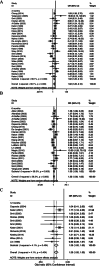Effectiveness of interventions to improve medication adherence in adults with depressive disorders: a meta-analysis
- PMID: 35858887
- PMCID: PMC9301839
- DOI: 10.1186/s12888-022-04120-w
Effectiveness of interventions to improve medication adherence in adults with depressive disorders: a meta-analysis
Abstract
Background: Non-adherence to medication is a major obstacle in the treatment of depressive disorders. We systematically reviewed the literature to evaluate the effectiveness of interventions aimed at improving adherence to medication among adults with depressive disorders with emphasis on initiation and implementation phase.
Methods: We searched Medline, EMBASE, The Cochrane Central Register of Controlled Trials (CENTRAL), PsycINFO, Social Science Citation Index and Science Citation Index for randomized or non-randomized controlled trials up to January 2022. Risk of bias was assessed using the criteria of the Cochrane Collaboration. Meta-analyses, cumulative and meta-regression analyses for adherence were conducted.
Results: Forty-six trials (n = 24,324) were included. Pooled estimate indicates an increase in the probability of adherence to antidepressants at 6 months with the different types of interventions (OR 1.33; 95% CI: 1.09 to 1.62). The improvement in adherence is obtained from 3 months (OR 1.62, 95% CI: 1.25 to 2.10) but it is attenuated at 12 months (OR 1.25, 95% CI: 1.02 to 1.53). Selected articles show methodological differences, mainly the diversity of both the severity of the depressive disorder and intervention procedures. In the samples of these studies, patients with depression and anxiety seem to benefit most from intervention (OR 2.77, 95% CI: 1.74 to 4.42) and collaborative care is the most effective intervention to improve adherence (OR 1.88, 95% CI: 1.40 to 2.54).
Conclusions: Our findings indicate that interventions aimed at improving adherence to medication among adults with depressive disorders are effective up to six months. However, the evidence on the effectiveness of long-term adherence is insufficient and supports the need for further research efforts.
Trial registration: International Prospective Register for Systematic Reviews (PROSPERO) number: CRD42017065723 .
Keywords: Major Depressive Disorder; Meta-analysis; Systematic review; Treatment Adherence.
© 2022. The Author(s).
Conflict of interest statement
The authors declare that they have no competing interests.
Figures
Similar articles
-
The future of Cochrane Neonatal.Early Hum Dev. 2020 Nov;150:105191. doi: 10.1016/j.earlhumdev.2020.105191. Epub 2020 Sep 12. Early Hum Dev. 2020. PMID: 33036834
-
Interventions for adults with a history of complex traumatic events: the INCiTE mixed-methods systematic review.Health Technol Assess. 2020 Sep;24(43):1-312. doi: 10.3310/hta24430. Health Technol Assess. 2020. PMID: 32924926 Free PMC article.
-
Effectiveness of Videoconference-Delivered Cognitive Behavioral Therapy for Adults With Psychiatric Disorders: Systematic and Meta-Analytic Review.J Med Internet Res. 2021 Dec 13;23(12):e31293. doi: 10.2196/31293. J Med Internet Res. 2021. PMID: 34898445 Free PMC article. Review.
-
Psychological interventions to improve self-management of type 1 and type 2 diabetes: a systematic review.Health Technol Assess. 2020 Jun;24(28):1-232. doi: 10.3310/hta24280. Health Technol Assess. 2020. PMID: 32568666 Free PMC article.
-
Effectiveness of eHealth interventions for improving medication adherence of organ transplant patients: A systematic review and meta-analysis.PLoS One. 2020 Nov 5;15(11):e0241857. doi: 10.1371/journal.pone.0241857. eCollection 2020. PLoS One. 2020. PMID: 33152010 Free PMC article.
Cited by
-
Association between childhood trauma and medication adherence among patients with major depressive disorder: the moderating role of resilience.BMC Psychiatry. 2022 Oct 14;22(1):644. doi: 10.1186/s12888-022-04297-0. BMC Psychiatry. 2022. PMID: 36241986 Free PMC article.
-
Modified Morita Therapy for Treating Hospitalized Patients with Depression.Actas Esp Psiquiatr. 2025 Mar;53(2):324-330. doi: 10.62641/aep.v53i2.1714. Actas Esp Psiquiatr. 2025. PMID: 40071371 Free PMC article.
-
Prevalence and determinants of antidepressant non-adherence among patients with major depressive disorder in Ethiopia: a multi-center cross sectional study.Sci Rep. 2025 Aug 14;15(1):29775. doi: 10.1038/s41598-025-15102-9. Sci Rep. 2025. PMID: 40804443 Free PMC article.
-
A Multi-Center, Open-Label, Single-Arm Study to Investigate the Early Effectiveness of Esketamine Nasal Spray in Patients with Treatment-Resistant Depression Using a Mobile Self-Monitoring Application.Pharmaceuticals (Basel). 2024 Aug 30;17(9):1143. doi: 10.3390/ph17091143. Pharmaceuticals (Basel). 2024. PMID: 39338307 Free PMC article.
-
Efficacy and tolerability of minocycline in depressive patients with or without treatment-resistant: a meta-analysis of randomized controlled trials.Front Psychiatry. 2023 Jun 5;14:1139273. doi: 10.3389/fpsyt.2023.1139273. eCollection 2023. Front Psychiatry. 2023. PMID: 37342175 Free PMC article.
References
-
- GBD 2017 Disease and Injury Incidence and Prevalence Collaborators Global, regional, and national incidence, prevalence, and years lived with disability for 354 Diseases and Injuries for 195 countries and territories, 1990–2017: a systematic analysis for the global burden of disease Study 2017. Lancet. 2018;392:1789–858. doi: 10.1016/S0140-6736(18)32279-7. - DOI - PMC - PubMed
-
- Kazdin AE, Rabbitt SM. Novel models for delivering mental health services and reducing the burdens of mental illness. Clin Psychol Sci. 2013;1:170–191. doi: 10.1177/2167702612463566. - DOI
-
- World Health Organization. The global burden of mental disorders and the need for a comprehensive, coordinated response from health and social sectors at the country level. 2011; December:1–6. http://www.who.int/mental_health/WHA65.4_resolution.pdf.
-
- World Health Organization. Depression. 2021. https://www.who.int/news-room/fact-sheets/detail/depression.
Publication types
MeSH terms
Substances
LinkOut - more resources
Full Text Sources





